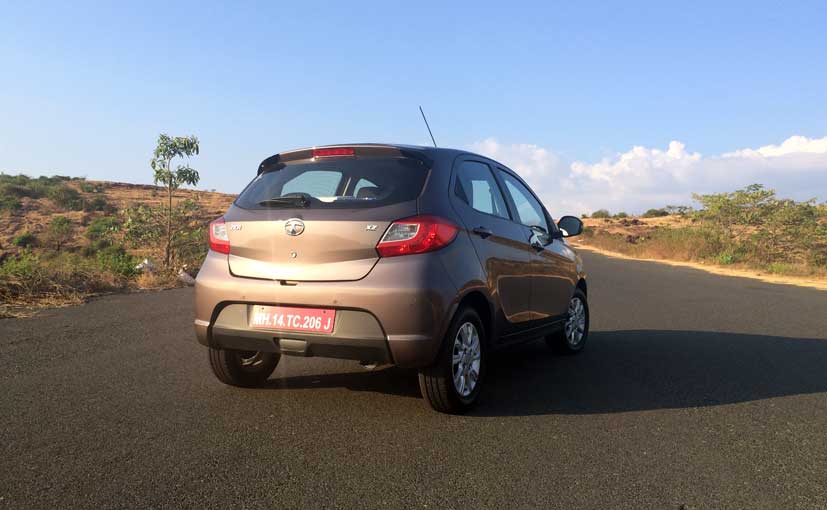
Tata Tiago, which was initially unveiled by Tata Motors as the Zica, is definitely the company’s best yet. Now I remember saying the same for the Aria, and the Zest. And even though at the time, the statement held true for both those cars, it rings truer today than ever before. I’m trying not to gush because this is something that I’ve been waiting for, literally for years! Ever since I started tracking Tata Motors – first as a financial correspondent and then as a motoring journalist – I’ve been waiting for this big change, or a major turning point to come around. I’ve waited for a contemporary and modern product that is finally global and not just local in its promise and attribute. We have seen little hints of that in the past from the likes of Mahindra and Tata, but perhaps the bike makers have gone further in achieving this than the indigenous carmakers.
The company took the decision to rename the Zica as Tiago since it was uncomfortably similar to the ‘Zika’ virus that continues to spread across the world. The Tata Tiago name was chosen after a global crowd-sourcing competition called ‘#FantasticoNameHunt’ was conducted in which fans got to vote for their preferred new name from a shortlist of 3 suggestions – Tiago, Adore, and Civet.
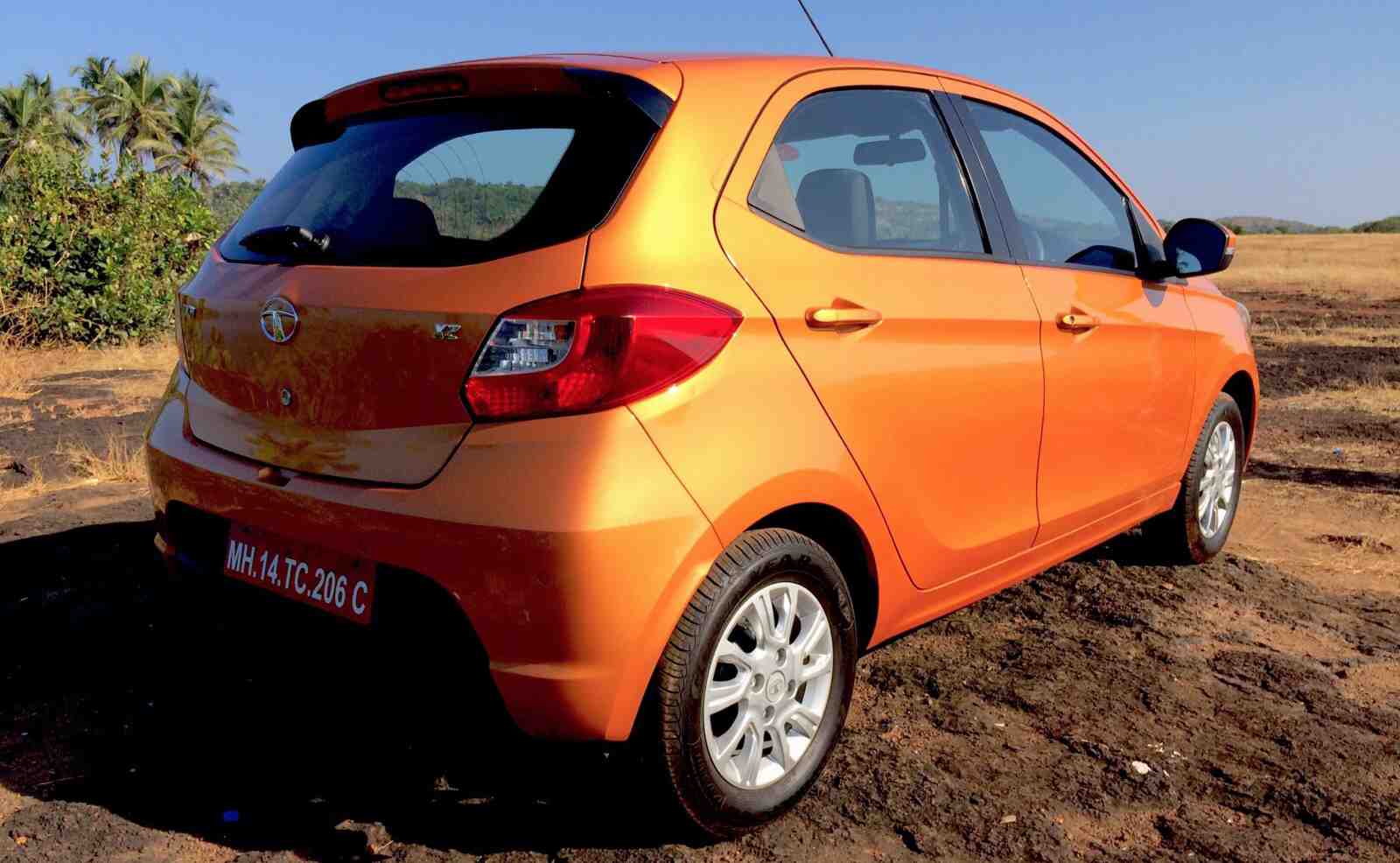
Tata Tiago Boot
So, you look at the Tata Tiago and it looks like it can stand tall and proud amongst the clutch of global entry car hatchbacks – and more than matches the average quality and design they offer. The Tiago was named initially named as the Zica because Tata believes it is a zippy car! And that is true to a certain extent. The zippy nature is accentuated more by its shape and compact proportion than by its performance. The Tiago seems to have been intentionally designed to be a car Tata can position very aggressively to hit the Maruti Suzuki Celerio, Hyundai i10 market with attributes more like the Swift or Grand i10!
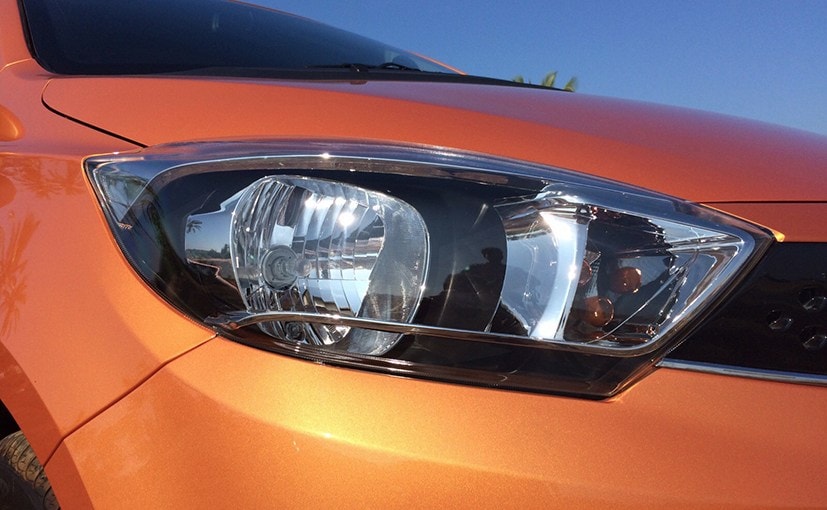
Tata Tiago Headlamp
The car looks new and fresh. The front grille and headlamps are very well finished. The headlamp has layering and also a chrome element running through it – which is very organic and new. The rest of the face is understated, which is refreshing. The metal all around the car has creases and light-catching surfaces – both very new for Tata, and very well executed. There remain some issues like inconsistent panel gaps and fits. But on the whole this car is a huge leap for Tata in design and manufacturing terms. The Tiago appears to have been designed very consciously as a compact small car. Its 14 inchers fit the wheel wells very nicely. The rear looks a bit Grand i10-like but the metal is nicely creased in the hatch door too. The car seems to sit a bit low at the rear and that curtailed what I saw on the interior rear view mirror, which was very annoying. The cabin is well appointed. Fit and finish and quality of materials are much improved. I liked the contouring on the seats, and the layout of the dash and central console. The plastic treatment on the car’s A-pillar is very neat and blends beautifully with a very well finished headliner. The dash is two tone and uses black and grey – though black is the predominant, which looks sporty I have to say – since the black upholstery is also understated and avoids any geometrical print as seen in the past.
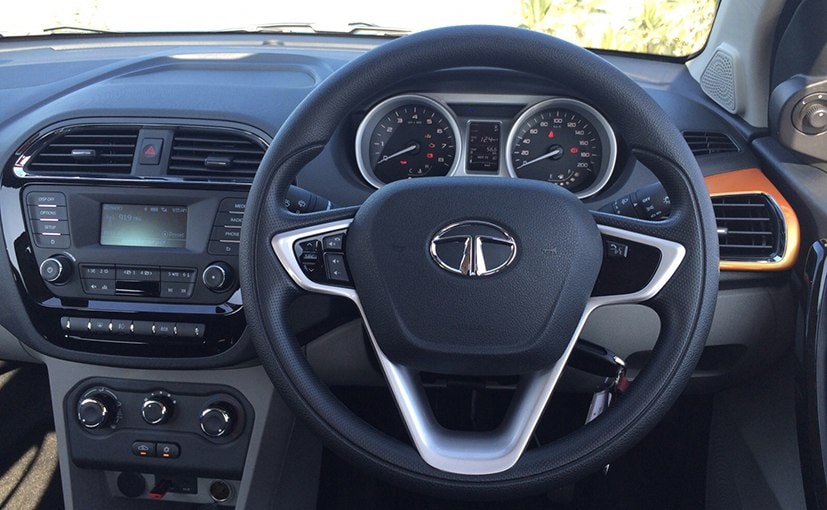
Tata Tiago Interiors
The AC vents are well designed and the side vents protrude to offer better airflow to the front passengers. It also gives us a new design element as Tata has used outside body colour on them. This is only for top end variants in orange and red body colour – the rest get a piano black finish, which is also upmarket and well executed. The interior has really surprised me just as much as the exterior has frankly! The car has a host of connectivity features and that includes a juke app – which allows you to pair one main phone and multiple others through it – to stream shared music from all of them. There are steering mounted controls and reverse parking sensors on the high end variant XZ.
Tata has gone with new powertrains on this car with both petrol and diesel going 3-cylinder. I drove the 1.2 Revetron petrol first, and it’s a bit of a noisy little thing. Being a 3-pot, that is not surprising, but it’s the kind of sound that gives you a fun feeling rather than an annoying one. Tata has consciously decided to opt for 3-cylinder engines to achieve higher mileage (figures for which Tata has not shared with us as yet) and keep prices very aggressive. Tata does have the 1.2 Revetron on the Zest and Bolt, but that’s a 4-cylinder and I was very disappointed with its performance. That engine comes across as sluggish and lacking in power, while the reworked motor, which drops a cylinder, is surprisingly more fun. It is more responsive and gives the overall performance a much better character. The Tata Tiago isn’t as zippy as I would have liked, but it is manoeuvrable, and boasts very good ride quality. The handling is also much better than other Tata cars, and overall this car works. Tata has hinted that there will be an AMT variant that comes later in 2016, but for now I am okay with the 5-speed manual.
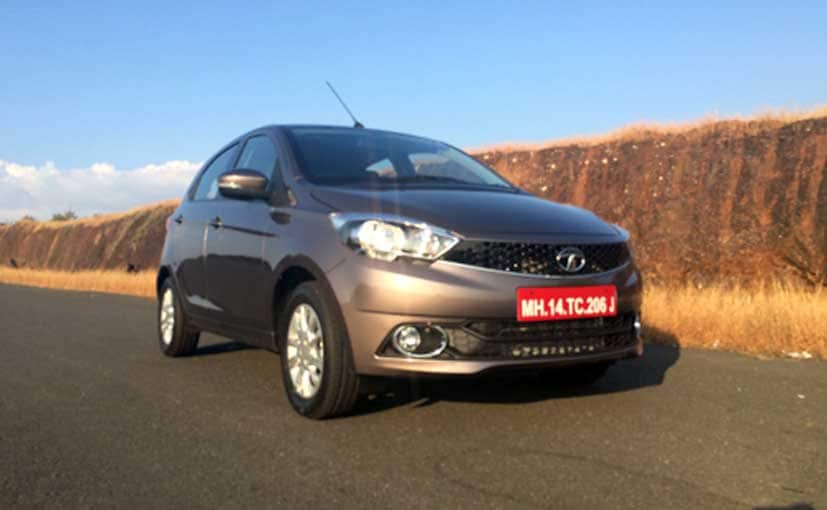
Tata Tiago Front Profile
Okay so now I’ve switched cars, and gone from the Sunburst Orange to the Espresso Brown – also switching powertrains of course! And there is a completely different character right away. 140Nm of peak torque and it kicks in as low as 1800rpm. This is the instant differentiator between the petrol and diesel engines. Of course, petrol engines in general do deliver less torque than like diesels, but the delivery of that torque on the Tiago’s new Revotorq is good. Tata has said this will be the first of a new family of diesels we will see from it. On the Tiago, I do think the petrol comes across as more refined overall, but the 1.05 litre diesel does a little bit more. It is punchy and a little more fun. And it’s a little bit more crazy – and I like that! The engine sounds way noisier and again I don’t mind the noise as it gives the car a lot of vroom, which will stand it in good stead in this segment. The extra weight up front adds to the handling, and I will have to say that despite the raspy slightly harsh nature of the engine I do still like the diesel Tiago more than the petrol.

Tata Tiago Rear Profile
The Tiago is likely to launch in March 2016. I expect prices for the petrol to start at 3.65 lakh, and the diesel at about 4.35 lakh. Yes – aggressive indeed. And the fully-loaded variants will go upwards of 5 lakh, but shouldn’t breach the 6 lakh mark.
[“source-auto.ndtv”]





